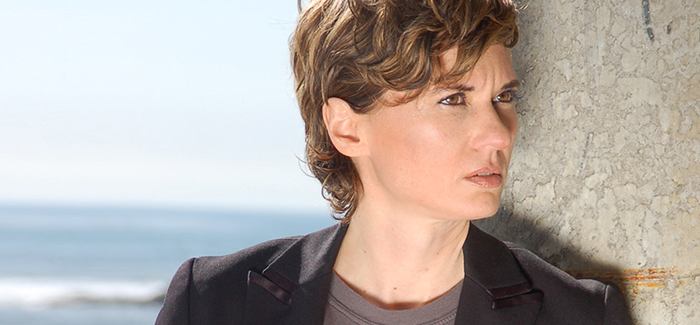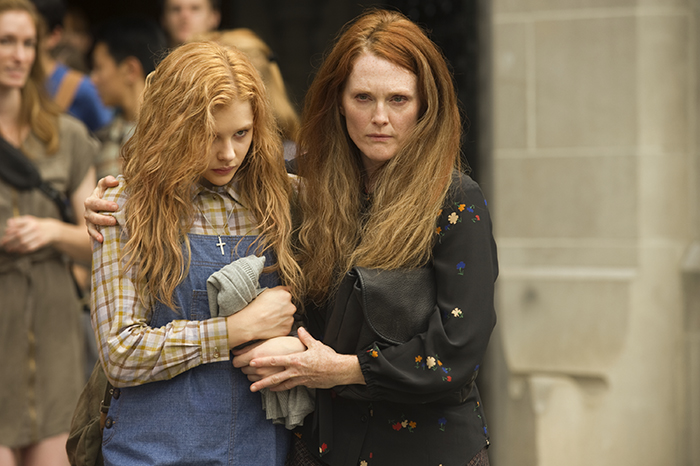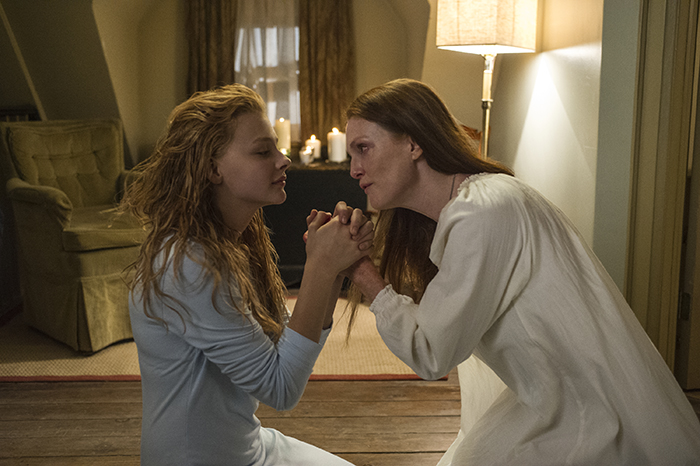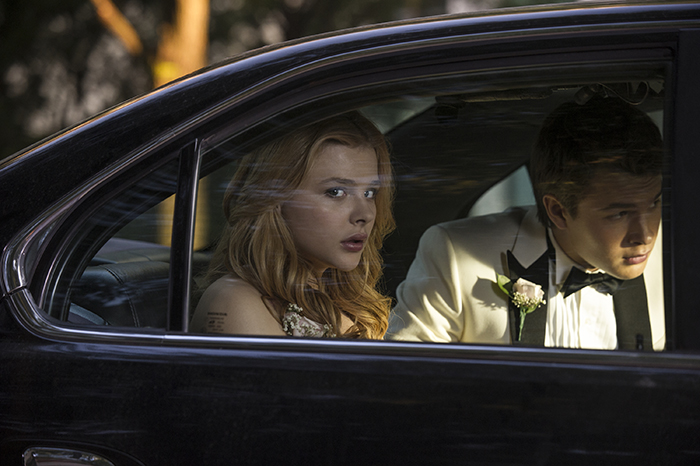
Kimberly Peirce, AB’90. (Photo courtesy Kimberly Peirce)
Kimberly Peirce, AB’90, revives the pop culture classic.
When I spoke with director Kimberly Peirce, AB’90, about her third feature film, Carrie, she was busy with postproduction. “You’re watching a terrible print of the movie with great sound, and then you’re watching a beautiful print of the movie with no sound,” Peirce said, explaining the process of fixing the sound mix and correcting the color. “And you’re the only person who’s seeing it both ways at once.” She relishes the challenge. “You perfect these different components of the movie in all these separate pieces, and then at the very end you marry them together. I don’t think most people know that.” Peirce’s Carrie tackles a pop culture classic by adapting Stephen King’s 1974 debut novel. Brian DePalma’s 1976 film version also casts a long shadow. It was nominated for several Oscars, including a nod to Sissy Spacek as Carrie White. But the director of Boys Don’t Cry (1999) and Stop-Loss (2008) brings her own firepower to this tale of a telekinetic girl, her first period, her overbearing mother, and a prom to remember. Pulling the events 40 years forward into our era of camera phones and cyberbullying, Carrie stars Chloë Grace Moretz in the title role; Julianne Moore as her Holy Roller mother; and scene-stealer extraordinaire Judy Greer as the concerned gym teacher who attempts to intervene. The movie opens nationally October 18. In an interview edited and adapted below, Peirce looked back on making an iconic story her own.

Why Carrie?
I had read it as a kid. But when [MGM] came to me to do the movie, I was hesitant because I had never done a remake. I hadn’t thought about Carrie as a movie—which I loved—in a long time. But based on my memory of DePalma’s film, it didn’t make sense. He made a great movie. What’s there to do?
Then I read the book, and I’m like, Oh my God! There’s so much to do. There’s the bullying. There’s the mother-daughter relationship. There’s the superhero origin story. There’s the ability to modernize it by 40 years. I read it pretty much cover to cover three times and understood why they wanted me to do it. Because these were themes I deal with.
I’ve always been drawn to true stories, but I’ve never had the benefit of such an amazing writer as Stephen King. I was really hit by just how fun and powerful a writer King is, and how wonderful of a storyteller. He takes such delight in all his characters, and he’s writing from the subconscious, so this stuff is perfectly formed in a really deep way.
Hopefully, there’s bandwidth for two really good films that go in different directions. Sissy was 26 when she made the movie, and Chloë is 15. Even though Sissy’s acting is brilliant, Chloë’s acting is simply different because she was a girl who hadn’t had sex, who hadn’t been to the prom, who lived at home, still was under her mother’s control. Instead of taking an adult and making her younger, I take a child actor and grow her up on screen.
How do you do that?
Get inside who that person really is, what they want out of life. Then get inside the character and what they need. Find the composite where the actor and the character become one. Some actors have said to me, “I don’t know if I can be that person.” I’m like, you have to be that person as you.
Chloë had the firmest handshake in the world. I said to her, “You’re too confident. You’re telling me everything you think I want to hear. But I want to hear what you’re most scared of and what you want. You have to let me shape you and break you down. Hilary [Swank, in Boys Don’t Cry] lived as a boy for six weeks; I need you to live as Carrie to the extent that we can do that.”

What about Julianne Moore as Carrie’s mother?
Julianne’s one of our greatest living actors. She takes this person who could have been cartoonish and breathes such mastery and authenticity and life into her. Once you have that, Julianne then can make Margaret odder. She scratches herself; she bangs her head. We got to do pretty crazy things because she’s so grounded. Margaret is a great horror figure, but we still maintain the fundamental authenticity of that person.
You really see Chloë’s game go completely up because she gets to be a great actor with another great actor. Chloë is technically on child’s hours, so very short days. Basically, the whole set mobilized around Chloë’s hours. If her head went off screen, we lost the shot, so Julianne would grab her head in the middle of a take and bring it back and put it right into the sweet spot of the camera. It was like, whoa. They blossomed separately and as this mother-daughter unit. You’re going to see in the movie; they have a huge journey to go through. It’s birth to death.
The gym teacher occupies a space between adolescence and motherhood because she’s in charge, but she’s still a young woman. What did Judy Greer bring to the role that surprised you?
Judy and Julianne were the two female adult figures in the movie. Carrie bounces between going home to that mom and coming to school and this mom. Judy has a moral center, she has a gravitas to her, but she’s funny. She had it all figured out: “I’m the teacher who really doesn’t care about teaching, and I already have my summer vacation planned. I’m going to Guatemala, and my bags are packed. And I no longer even bother wearing the right outfit to school anymore because I’m one foot out the door. I’m probably still smoking, and I shouldn’t be smoking.” Then she takes on the cause of this problem girl. She gets caught up in this teenage melee: “These girls are brats. They’re monsters, and I’m going to teach them something before they go out into the world and make a mess of everything.” The character even says, “I was bullied when I was in high school. I want to get these bitches back.”
Bullying is at the core of Carrie. How do you update that aspect so that it resonates today?
You go inside of it and look at how it really is. How would these girls act in the locker room nowadays? Would they throw tampons? Would they yell? Would they use their cell phones? I interviewed lots of girls that age, and I read lots of stories. The young people you cast will tell you whether what you’re doing is true or not. And Chloë is a truth barometer. Does it feel authentic to her?
Cyberbullying is such a big part of bullying now. The girls videotape Carrie while they yell “Plug it up!” and that ends up being a big part of the story. What do you do with a video? You upload it. People see it.
Bullying, let’s say it’s fun and delicious because there’s a conflict there. We have a girl that we love, who is a misfit, gets made fun of. Well, there’s something interesting about that bullying scene that we watch. I try to do that in all my movies. You don’t celebrate the violence, but you’re engaged by it.
It’s part of that icky feeling of implication …
You’re implicated because you think Carrie kind of deserves it because she’s annoying. Because she’s a weakling and sometimes there’s a part of us that likes the strong to prey on the weak because we’re angry that the weak are weak. I want you to identify with Carrie, but I also want you to identify with the girls. I try to put you on the side of Carrie, on the side of the girls, on the side the teacher. You’re constantly engaged as if you could be any of those people.

How did you handle Carrie not knowing about her period?
That was one of the biggest challenges. She’s not been raised in a cave. She goes to a public school. It’s not that she doesn’t know what a period is, she just doesn’t want to believe that this is happening to her because she’s been told that sexuality is a bad thing. There’s a level of denial, but there’s not a level of stupidity.
Carrie subverts the crowning achievements of the teen movie—the makeover and the prom.
Absolutely. It’s the Cinderella story turned inside out. Instead of ending up with the prince, that’s kind of your midpoint, and that’s when your horror gear really kicks in. In a lot of ways you’ve been waiting for the horror. You also get the superhero origin story, like the Hulk. What happens if you get him mad? He’s going to freak out.
Telekinesis seems like an extreme manifestation of the self-harming behaviors of some adolescent girls.
If a girl were going to have a superpower, it’d be telekinesis. It’s bodily. All the stunts are built this way—at the prom she’s humiliated and angry, and she pushes out the emotion and creates this wave that turns over everybody. She gets angry and she’s able to crush things at a distance. When she wants to stop the villains, she stamps on the ground and opens up a fissure in the earth. I think she goes beyond gender in that she has supreme powers. It’s emotions turned into physical strength. She becomes this monster that causes pain in the middle to the late stages of the movie, and then we have to reclaim her at the very end.
There are already two endings in circulation.
I followed King, and King climaxes with the stones destroying the house. Brian didn’t have the resources [in 1976]. I’m excited about bringing that house to life, which is a real trope in horror films.
And women’s pictures more generally.
What our sound designer Karen Baker Landers does with the soundscape is amazing. Carrie’s tiny house is rickety. It’s falling apart. It’s in love with Carrie and scared of Carrie. When Carrie and Margaret fight, the house feels it, which climaxes with the stones coming down. That is the natural end of these powers. They grow and they grow and they grow, and they destroy things around Carrie.
It’s a shame in a way that a girl comes into her powers and they’re too much—they destroy her. It’s a little depressing.
Or complete. But I think you’re right. Certain structures demand closure in a certain way, and for Carrie just to walk away unscathed after all that’s happened, I believe you would feel we actually hadn’t done our job and completed the story. I think it’s what Aristotle said: There’s a beginning and a middle and an end, and it’s about finding the right ones and putting them in the right order. So if you have to have a tragic or difficult ending, as long as it’s the right ending, I don’t even think of it as happy or sad. I think of it as right.
What’s next?
I have two things I’m writing. One deals with cyborg technology—where we’re going with being augmented. That’ll probably be the next movie because it’s commercial, but it’s got these deep elements that I want to deal with.
The other is a funny, dark family tragedy-comedy about my dad dying. He was a charismatic guy who had been with a lot of different women and had children by different ones of them. I didn’t want to deal with this, but of course I went back and got sucked into a family drama that was just a wild adventure.
Will we ever see your William Desmond Taylor movie? His career and murder rival Chinatown for classic California noir.
I love that story. I have to just get that financed. It’s a great script. Give that a shout-out.
Amy Monaghan, AM’93, is a senior lecturer in the Department of English at Clemson University. She is a graduate of Wellesley College and has a master’s in cinema studies from New York University. Her writing has appeared in Black Clock 15 and on TheAwl.com.
